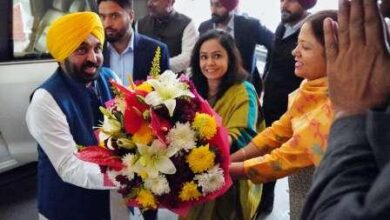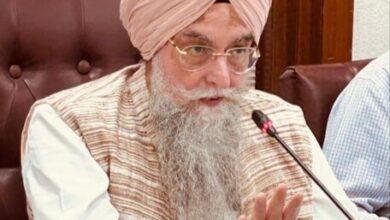No threat of bird flu in Punjab yet, but government fully prepared to tackle any situation: Tript Bajwa

- Non-Veggies need not be afraid, just need to eat fully cooked food
- Punjab Government to provide every possible support to Punjabi University to overcome financial crises
- Punjab to spend Rs. 2775 crore for the overall development of villages under second phase of Smart Village Campaign
Chandigarh, January 6: The Punjab Animal Husbandry Minister Mr. Tript Rajinder Singh Bajwa said that no case of bird flu has been reported in the state so far, but the state government has taken all precautionary measures to deal with any situation. While addressing a press conference today here at Punjab Bhawan to list the achievements of the departments under him, Mr. Bajwa said that the people who eat eggs and meat do not need to be afraid, they just need to eat these products cooked properly.
The Minister said that the Animal Husbandry Department along with other departments of the state government was closely monitoring to ensure that sub-standard meat and fish were not sold in the market. He also appealed to the people to refrain from spreading rumours and report any such rumour to the administration immediately.
He said that the Rural Development Department is fighting at the forefront against COVID-19 and had sprayed Sodium Hypochloride three times in 12,860 villages of the state. ‘The Department of Rural Development prepared 6.45 lakh masks through 4,000 Self Help Groups in the state and every Panchayat of the state was empowered to spend up to Rs. 50,000 for the fight against Covid, the minister said.
Briefing about the development works done by the Rural Development Department Mr. Bajwa said that Smart Village Campaign is a flagship scheme of the Government of Punjab which aims at transforming the villages of the state launched in 2019 with 19,132 works and an investment of Rs.835 crore in the first phase. During the second phase total 48,910 works are under development with a total outlay of Rs. 2,775 crores.
Talking about MGNREGA, he said that the present government had provided about Rs. 2400 crore as wages to the workers registered under MGNREGA scheme during last 4 years through and provided 9.29 lakh mandays employment. An amount of Rs. 2994 crore has been spent under this scheme since 2017, whereas only Rs. 2027 crore was spent during the last 10 years of the previous government (2007 to 2017). Under MGNREGA, development works are being carried out in 2364 schools on which Rs. 18 crore has been spent so far.
Mr. Bajwa said that the present Captain Amarinder Singh led government has taken a major step to empower women by providing 50% Reservation for women in Panchayati Raj Institutions. Another step has been taken for empowering panchayats, by implementing majority of development works directly through gram panchayats, and the role of the officials is limited to providing technical inputs, supervision and quality control only. A total of Rs. 4,016 crore has been disbursed to 13,269 Panchayats.
He also said that the income of Panchayati and Shamlat lands has increased and as per data of this year the income was 374.96 crore as against 292.74 crore in 2016-17. The average income per acre was Rs. 20546 in 2016-17, which has increased to Rs. 27,841 per acre this year. During the present regime 917 acres of Panchayat land was vacated of illegal occupations and given to farmers on annual lease.
The Minister said that Under PMAY, 15,193 houses have been constructed for the beneficiaries and 5742 houses are near completion. Beneficiaries under this scheme were being provided assistance of Rs. 1,20,000 in three instalments. Under PSRLM, 21,163 self-help groups have been formed covering2,20,240 women households. The women-members of these SHGs have saved Rs. 45.40 cr. and leveraged another 115 cr. from the financial sector.
Under a special drive for cleaning and maintenance of village ponds, 192 village ponds have been developed under the Seechewal and Thapar model. Apart from this more than 12,000 village ponds were cleaned.
Mr. Bajwa informed that Rs. 1 crore has been spent per village for the overall development of 63 villages of Guru Nanak Dev ji’s Charanchoh in the state and 77 lakh saplings were planted.
Replying to a query about the Punjabi University, Mr. Bajwa said that the Punjab Government would extend all possible help to the Punjabi University to get it out of the financial crisis. He said that every aspect to overcome the financial crises of Punjabi University was being worked out by the committee. He also said that the required grant would also be provided by the government to bring the Punjabi University back on track.
Animal Husbandry Department:
Sharing information about the Animal Husbandry Department, Mr. Tript Bajwa said that a new Veterinary Science College has been started at a cost of Rs. 92.14 Crore in Rampura Phool town of Bathinda district. First batch classes have started in this college. He said that Rs.200 crore was provided to 9941 new dairy farmers of the state for setting up of new dairy units.
He also said that about 20890 educated youth of the state were imparted training for dairy farming. Assistance of Rs. 5 crore 3 lakh was provided to 346 beneficiaries for construction of modern cattle sheds. Sharing another important information, Mr. Bajwa said that in order to assist the state health department in the covid-19 testing, certified by ICMR Covid-19 testing labs have been set up at NRDDL, Jalandhar and Guru Angad Dev Veterinary and Animal Sciences University Ludhiana. So far, about 2.00 lakh samples have been analyzed by scientists in both the labs.
He also informed that Punjab Veterinary Vaccine Institute, Ludhiana has been given RKVY to develop vaccines for various animal diseases in the state. Under the scheme, the institute is being upgraded with Rs 32.00 crore. The institute has started production of Cell Culture Swine Fever Vaccine with new technology.
Giving information about 4 HF Breed Bulls provided to Punjab, Mr. Bajwa said that the Government of India has imported these Bulls from Germany. These are expected to start production of semen within 24 months and about 8000 to 10000 semen straws are expected to be produced during the first year of production. In addition to this a Regional Research and Training Center for Buffaloes with objectives to improve the Buffalo breeds through genetic improvement and to establish an elite herd of Buffalo, with a total cost of Rs.20.00 Crores is being established at Village Booh, District Tarn Taran.
Another State of Art Indigenous Cattle Breeding Farm, Gokul Gram at Bir Dosanjh, Nabha has been established at a cost of Rs. 12.84 crore to house elite indigenous breeds of cattle (Sahiwal & Gir) with the objective of their Conservation, Development and Propagation.
The Department is also running a programme free Artificial Insemination to 11.00 lakh eligible Buffalo & Cattle with quality semen under NAIP (Nationwide Artificial Insemination Programme), Government of India in all the villages of the state. The inseminated animals are being Ear-tagged with a 12 digit Ear tag and their data is being uploaded to the National data base under INAPH software. Production of HGM bulls of Murrah, Nili Ravi and Sahiwal under P.T. Murrah, P.S. NiliRavi & P.T. Sahiwal projects is being done at the cost of Rs 23.49 crore, Rs 5.24 crore & Rs 13.02 crore respectively in the state
The Minister also announced to hold 12th Livestock Championship & Expo-2021 at Batala, District Gurdaspur from 16-22 March, 2021
In another major development 257 Exotic Pigs have been imported by the Government of India from England for genetic up-gradation in the germ plasm of the existing pigs in the North Eastern States. Due to African Swine Fever outbreak in North Eastern States these pigs were temporarily relocated by the Government of India to Punjab State till African Swine Fever outbreak is controlled. These pigs are being kept at Government Pig Farms, Nabha and Hoshiarpur. The piglets so born will be distributed to the pig farmers of the state, which will enhance the productivity & boost-up the genetic upgradation in Pig Farming and thus, the economy of the state.
A Demonstration Farm-cum-Training Center (DFTC) has been set up in village Ena Khera, district Sri Muktsar Sahib. This unit will help to increase shrimp production, to impart training to new/existing shrimp farmers, and to check water quality parameters of the saline affected area of the State.
Briefing about the Fish Famring in the state the Minister said that the Shrimp farming, which started with only 14 acres in the state, has now reached 410 acres. This year 788 tonnes of Shrimp fish was produced and the fish farmers got a remunerative price of Rs. 350-400 per kg. This year 1865 acres of new area was brought under fisheries, at present 41,827 acres of land in the state is being engaged in fish farming. A new fish farm is being set up at village Qillianwali in Fazilka district.
Department of Higher Education and Languages:
Highlighting the achievements of the Department of Higher Education, Mr. Bajwa said that two new Universities – Jagat Guru Nanak Dev Punjab State Open University, Patiala and Guru Tegh Bahadur Punjab State University of Law, Kairon Tarn Taran were set up. In addition 12 new government colleges have been set up and 8 college buildings are under construction. Recruitment process of 8 Principals, 1000 Associate Professors and 48 Librarians has been started in Government Colleges. Out of the sanctioned 1925 posts of Assistant Professors in Government Aided Colleges, the process for recruitment of 1300 posts has already started.
He also informed that last year 25 writers were honored by the Language Department with an amount of Rs. 21,000. The awards pending for the last 5 years have been announced and these awards would be given this year.




